We’re no experts. Sure, we might have sold our stuff and quit our jobs to travel, but we’ve made mistakes. A lot of mistakes. We’ve had days where we wonder what in the world we are doing. Where in the world are we going? But, throughout the past year, we’ve had hundreds of unforgettable experiences as a family. And we’ve learned a whole lot of tips for traveling with kids!
So with that said, we’ve compiled a list of 100 tips for traveling with kids that we’ve learned throughout the past year. We hope that some of these travel tips can help you on your next travel adventure, whether it’s near or far. Enjoy!
Travel Days
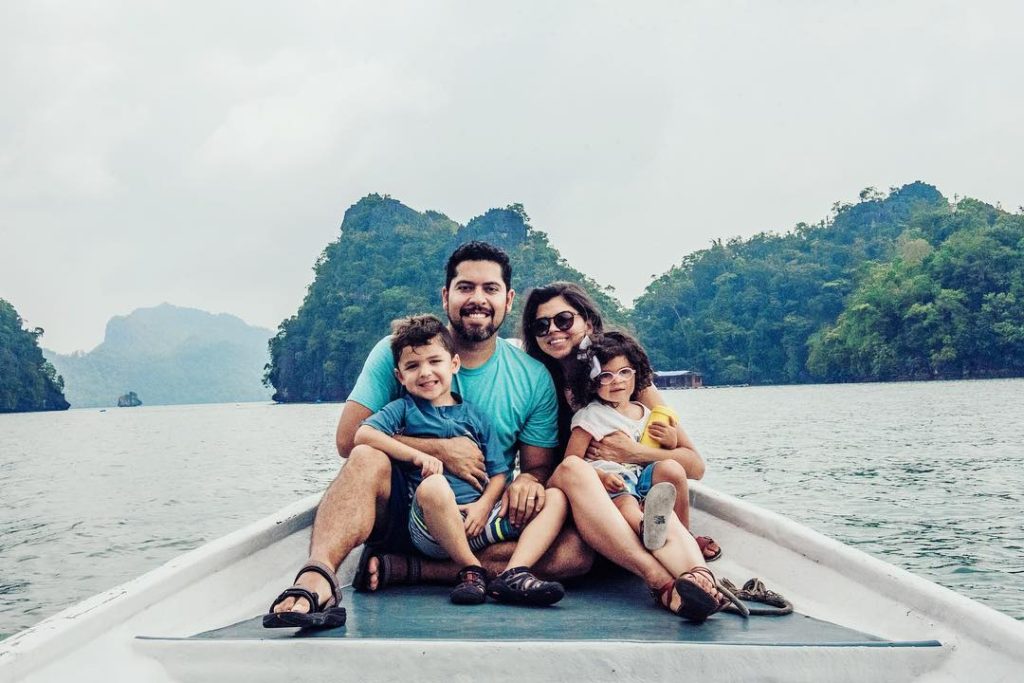
1. Visualize the logistics of your travel day. How are you carrying your luggage prior to checking it? What information or items do you need when you arrive at the airport or your new destination? Thinking about what your travel day will look like can ease some stress throughout the day because it helps you feel more prepared.
2. Afternoon flights work best for our family. We are not the earliest risers (except for our son Santi), so having time to finish packing up and heading to the airport with time to spare is key. For flights that are 5 hours and less, this lets us get to our new location in the evening, get dinner and a good night’s rest so we can hit the ground running the next day, ready to explore. For long flights, red eye flights tend to work best, since your kids will almost certainly sleep for some (or most of the flight)!
3. Snacks on flights make kids happy. I can’t even stress the importance of this! Snacking not only makes the time pass by peacefully, it keeps your kids from getting hangry, which is basically one of the worst emotions to deal with on a plane.
4. Save screen time for travel days. That way your kids will be more excited to use the phone/tablet during the flight, and it can give you a break from having to entertain them in cramped spaces.
5. Make sure you pre-load one or two new apps before a flight. There’s tons of free educational apps out there that give you samples of the paid product, so your kids can try them out and then if you want, you can buy the ones they like.
6. Also, don’t forget to download your airline’s app before taking off. In some cases, the in-flight entertainment and other content is only accessible through the airline app, and you might not be able to download it over the inflight WiFi once you take off.
7. Bring one or two new (small) toys that your kids can open on the flight if they start getting restless. If you haven’t noticed by now, getting through flights as a family is basically finding fresh ways to keep your kids quiet and entertained. We’ve covered food, screen time, and now toys. That trifecta can get you through for a couple of hours! And when you run out of all of those, you can always walk up and down the aisle haha.
8. Buses are way more comfortable than planes (and way cheaper too). We didn’t book a bus until months into our trip and we are kicking ourselves for not doing it sooner. Bus seats can be way more comfy, so kids (and you as well) can sleep better when needed. Yes, they’ll take longer, but for some reason our kids behave way better on a bus than on a plane anyway.
9. Arrive early to the airport, but try to board later if you have young kids. Getting through check-in, security (and immigration for international flights) is no small feat, so give yourself plenty of time so you don’t feel anxious and rushed. We generally arrive 2 hours early for domestic flights and 3 hours early for international flights. And we haven’t been late for a single flight out of 47 this past year!
10. Don’t forget to get gate tags for your stroller/car seat prior to boarding. That way you don’t have to worry about scrambling to get a tag are you’re trying to board the plane.
11. Keep track of your baggage claim tickets! Occasionally, your bags won’t make it on the plane with you, especially If you have quick connecting flights. Having the bag tag number makes it so much more easier to track your bag. Also, remember the brand and color of your luggage so you can provide a description for the staff in case they need to look for it.
12. Research Uber availability/ease of use in the city you’re arriving to. The last part of the travel day is usually finding a way from the airport to your accommodation. Unless you’re staying at a hotel with a shuttle, Uber is probably the next cheapest option. Not all cities have them, though, and the app might not have a van option for groups over 4 (or lots of luggage), so just check ahead of time.
13. Taxis are (usually) not the enemy. Chances are, as soon as you get past baggage claim, you’ll have tons of taxi drivers hounding you to use them to get a ride to your place. This freaked us out a bit in Bali when we arrived at midnight, no Uber was available, and we thought they were all out to kidnap us. Eventually we just accepted one of their offers, and we had a comfortable drive to the airport.
14. Taxi drivers will try their hardest to fit all your stuff in their small cars. Most of the time they make it work! We are a family of 4 who travels with 4 backpacks and 3 large suitcases, and somehow we’ve gotten all of our stuff to fit in a compact car! Mind you, two of our luggage were strapped on an open trunk and we were cramped in the back seat (because the last luggage was in the front passenger seat). But, those 30 uncomfortable minutes saved us a bunch of money, so small win there!
15. Don’t be afraid to ask for early arrival/late departure. This is especially important for red-eye flights, where you’re leaving at night and arriving in the morning. The last thing you want on a long travel day is to hang out at the airport for multiple hours because you can’t check in or you already checked out. The worst thing that can happen is that they’ll tell you no, but chances are they’ll be willing to accommodate you.
16. SIM cards at the airport cost more but they’re more convenient. Unless you have an international data plan (we do with Google Fi), you’ll want to be connected basically upon arrival to the airport if you want to grab an Uber. There will probably be SIM card kiosks just after the baggage claim, and while they are a bit pricier, they will set it up for you on the spot and then you can be connected for the rest of your trip. It can really be worth it after a long travel day!
17. Prepare for chaos when you reach immigration upon arriving in another country. The craziest arrival we had was to Cancun, where we waited in line for an hour. Make sure you and your kids go pee before you get in line!
18. If you have kids, though, you may be able to get on an immigration priority line. If you’re at immigration and your kids are cranky, play it to your advantage! Go stand next to a customs worker (they’re usually directing passengers into the immigration lines), and ask if they have a family line. We’ve found, the more upset our kids are at the time, the quicker they’ll get us through 😉
19. Bring melatonin for overnight flights in case your kids need it. Chances are, your kids will probably go to sleep eventually. But, natural melatonin sure helps them have a relatively peaceful night of sleep on the airplane.
20. Bring your own headphones on long flights. Typically each passenger will have a personal screen, and the plane might not have any earphones to give out, so make sure you have enough for the whole family, since the kids will enjoy the movies and shows they have access to.
21. The in-flight WiFi will probably suck ☹. The couple of times we’ve tried the inflight WiFi, it hardly worked, or was so slow that we couldn’t really use it to do anything. Hopefully this improves over time, but it seems like at this point if you get a WiFi package you’re rolling the dice on whether you’ll get any connectivity at all.
22. Get cash in the local currency upon arrival at the airport. Or you can bring dollars to exchange at the airport. You’ll need them if you need to pay taxi drivers or tip bellmen at your hotel.
23. Try hard not to be grumpy on a travel day. The grumpier you are, the grumpier your kids will be, and it becomes a never-ending cycle. Try to find the joy in a crappy situation!
24. If you’re grumpy, just know that you’ll get to your destination eventually! And that destination will be worth it. You can do it!
Travel Planning
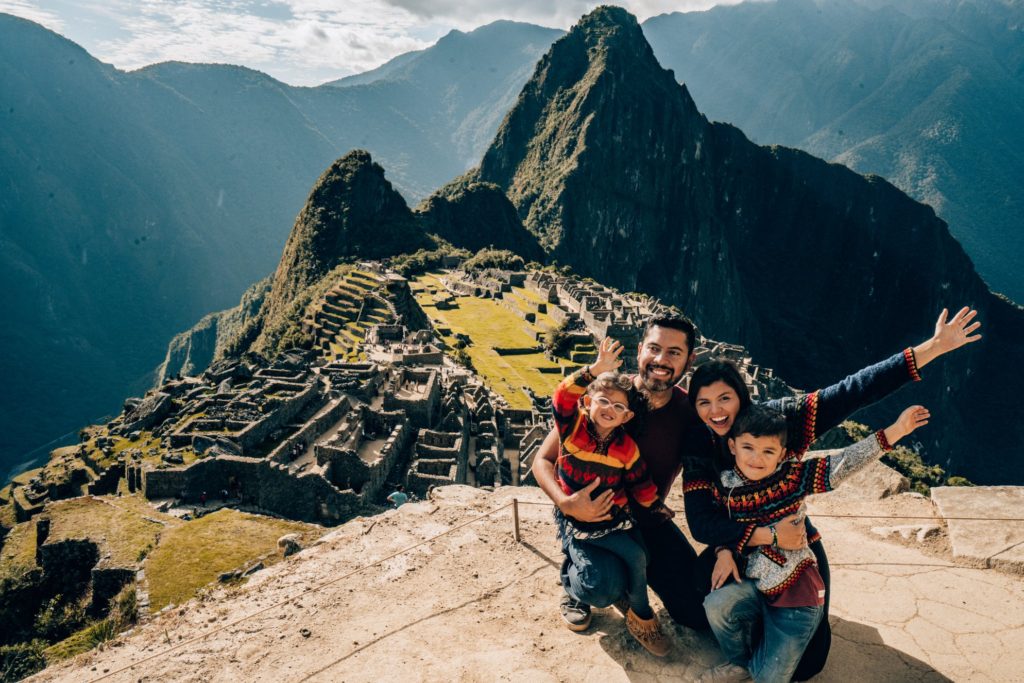
25. Be aware of when your desired destination has its busy season. Prices for pretty much everything can rise dramatically during a country’s busy season, so if you have flexibility to visit during low season, you can score good deals on flights, experiences, and accommodations.
26. Google Flights is our go-to tool for planning flights, but then book the flight directly from the airline. The website has a really intuitive interface where you can adjust your dates, number of stops, and even see prices for different destinations on a map. However, once you spot the flight you want, you’re better off going to the airline directly since sometimes we’ve noticed if you go through Google it messes up some of the pricing along the way.
27. Be creative when choosing seats for flights. For our family of 4, we try to book the 2 window seats and 2 aisle seats on a row, and then hope and pray that no one books the middle seats. When it works, it gives us 2 extra spaces to lay the kids out if they need to sleep! And if it doesn’t work, you can easily switch one of your aisle or window seats for the middle seat. I mean, does anyone in the world prefer a middle seat anyway?
28. We prefer Airbnb for longer stays (5+ days), hotels for shorter stays. Long stays might require getting laundry done, and hotel prices can balloon your budget if you stay a while, so we prefer Airbnb for long stays.
29. Read all of the Airbnb listing reviews, you can learn key information from them (outside noise, WiFi speed, etc). It sucks to show up at a place and realize the WiFi sucks, or the beds are hard, and then see that a reviewer had pointed that out already. Make sure to read all the reviews, and Airbnb can even translate the ones in other languages as well.
30. Remember weekly and monthly discounts for Airbnbs. Even if you’re not staying a full week, sometimes a 10-20% discount might make the stay even cheaper so play around with the dates and just leave early if you don’t need the extra days. And if the listing doesn’t show a discount, reach out to the host to see if they’ll give you one.
31. Plan a recovery day after long flights to get over jet lag. Your kids will thank you for this! Actually, your kids won’t thank you for this. But your sanity might when your kids wake up bright eyed and bushy tailed at 3AM, and you don’t have plans to show up exhausted to.
32. If a flight leaves after midnight, make sure you book it for the right date! It’s so easy to think you’re flying out one day later than you actually are, and then realize you screwed up, panic, and start rushing to the airport. Double and triple check your dates!
33. Travel hacking (AKA credit card points and rewards) helps offset costs. Look up the best credit card signup bonuses at the time you’re booking your trip, and use those trip expenses to get you those points, which you can then use for future trips.
34. Don’t buy the packaged “deals” on budget airlines. These are the ones that include a meal, checked luggage, early check in, and a seat assignment. Unless you have the same amount of luggage as people in your group, or you want all the perks that you don’t really need, then just pick only what you need afterward, and it will most likely be cheaper.
35. Try to have more than one checking account / debit card, and keep them separate. Sometimes your debit card might not work abroad, or it might get lost, so have a backup plan in case you need to access cash in a different way. Many credit card companies also offer ATM cash advances, although they can come with higher interest rates, so only use them as a last resort.
36. Use separate tags on your emails for airline tickets, rental cars, tours, etc. so you can pull them up easily when you need them. It’s always annoying to show up to the counter, and then have to scroll through a bunch of emails to find the one with your confirmation number, so make tags that you can use to filter your emails and find the right one quickly.
37. Have digital copies of your passports, IDs, credit cards, etc, but keep them secure. You never know when you might need them. Or if you’re hardcore, you can memorize absolutely everything. And then you should go on Jeopardy because that probably means you have a photographic memory. Or you’re willing to work really hard to remember random numbers and facts. Way to go!
38. Look up visa application requirements for the countries you’re visiting well in advance! You don’t want to be that tourist that gets stranded in a country because you assumed you could just show up and receive entry just by showing your passport.
39. Make sure you have at least 6 months of validity left on your passport. You might not be let in a country if your passport is close to expiring. Also make sure you have empty pages for passport stamps!
40. Sometimes planning on public transportation/Uber can be cheaper than renting a car (Mexico for example), and sometimes the opposite is true (Australia). Take the time to find the best option for your destination, that money saved can be used for an awesome excursion or tour!
41. Check multiple booking sites (Booking.com, Agoda, Airbnb) before making reservations; you might find better deals on one vs. another. Even hotels are starting to list on Airbnb for cheaper, so you never know where the best price will be.
42. Look up your accommodation on Google Maps to see what’s within walking distance. Grocery stores, restaurants, etc. nearby can help offset higher costs. You might think you’re getting a deal by staying outside of town for cheap, but then you have to pay a bunch for transportation which negates all your savings, so just be careful.
43. You can get way better prices on accommodations if you stay during the week instead of the weekend. I know this is harder if you have limited vacation days, but if you can plan a Monday through Friday trip, you’ll probably save on your stay.
Accommodations
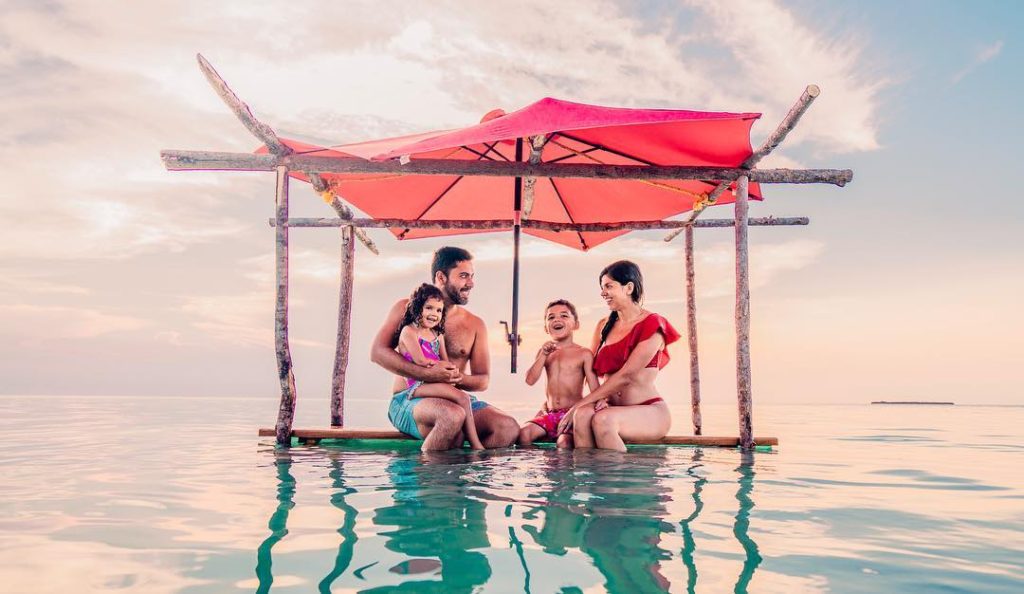
44. Finding places with washers/dryers or laundry service nearby is a must for full-time travel. Hotels will charge you an arm and a leg to wash a pair of socks, so even if you have to Uber it to a laundry service you’ll probably still save money getting it done somewhere else.
45. When booking Airbnb, verify that the WiFi is fast enough! It’s disappointing to show up to a place and realize the WiFi barely works and you can’t check email, social media, etc. When in doubt, send the Airbnb host a message asking for the WiFi speeds and they’ll (probably) be honest with you.
46. Remote places will probably have bad connectivity, prepare for it. Yep, some places you’ll have to accept that you won’t be able to catch up on your favorite show that week. But then again, you might be surprised. We did get to watch the Game of Thrones finale live in the middle of nowhere in Argentinian Patagonia 😉
47. Leave a review for your Airbnb host (and be honest). You can end up helping a lot of people avoid inconveniences you may have experienced, and you give the host the opportunity to rectify the situation for future guests. That’s some good karma right there!
48. Look into which power plugs you’ll need in a given country. Bring a universal power adapter like this one when in doubt. You don’t want to have to be searching for power adapters once you arrive!
49. If your accommodation has a kitchen, ask if they can provide basic condiments so you don’t have to buy them at the store. This makes it way cheaper to cook and saves you from taking time at the grocery store trying to find the right label for salt and pepper in the language of the country you’re in.
50. Ask if the tap water is drinkable, and if not, have a plan for getting water (or bring a filter with you). You don’t want to ruin your trip drinking non-potable water, so just play it safe on this one.
51. Food delivery apps (Uber Eats, Foodpanda, Rappi, and more) are all over the world, and have pretty cheap delivery fees when you don’t want to cook or go out to eat. You can even track where your food is at any given time, which is more interesting than you think!
52. Two adults and two kids 6 and under can all sleep in one double bed. But it’s as awful as you think. We consider ourselves budget travelers when we’re not working with hotels, and we have tried to save money by booking a place with one bed. And after that, never again! The back pain, discomfort, and constantly being woken up by your kids is not worth the 20 bucks a night saved by getting a small cheap place.
53. Make sure your kids know not to pee in the bidet 😉 I will neither confirm nor deny that my kids have done this. But seriously, when your kid asks you “Dad, why are there two potties in the bathroom?” then you have some explaining to do.
54. Be aware of the A/C situation when you book housing. Some places will advertise that the they have an A/C unit, but it will just be in one bedroom and the rest of the place will be hot. When in doubt, ask!
55. Check reviews for noise levels at the accommodation. Most Airbnb hosts won’t tell you if there’s loud bars or restaurants outside their place, but reviewers usually point it out if that’s the case. Sometimes you’ll think you’re getting a great deal, but really you’re right in the thick of the party zone and it becomes a nightmare for the family to get a good night’s sleep because of the noise.
56. Keep your Airbnb host in the loop on your arrival status. Sometimes they need to provide instructions on how to get to the accommodation or need to meet you there to drop off keys, so don’t forget to tell them when you’re planning on arriving. In Vietnam we had to wait an hour to be let in because we forgot to let our host know what time we were arriving!
Full-Time Travel Lifestyle
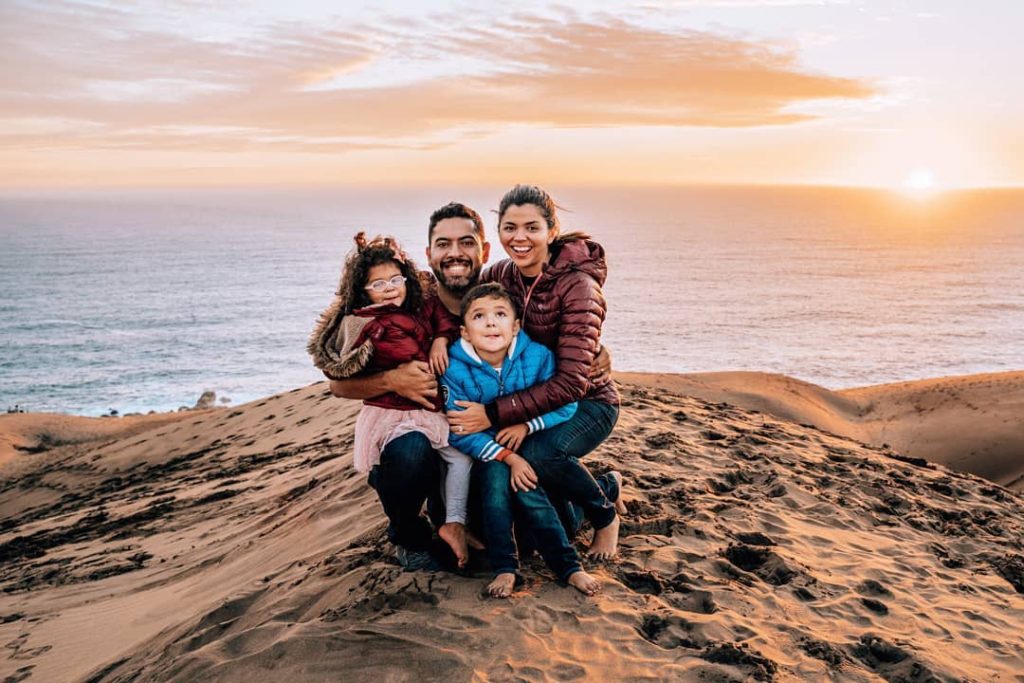
57. The preparation stage (selling stuff, quitting jobs, etc) is the hardest. You’re going to doubt if you’re making the right decision multiple times throughout the process. But trust us, it’s completely worth it and the emotional victory once you set off is one of the best feelings possible!
58. Bad days make good stories. Yep, just like the AJR song. If you’re traveling full-time, it’s guaranteed that you’re going to have some bad days. And in the moment, those bad days will suck and you’ll think twice about continuing your full-time journey. But that day will pass, your mind will clear up, and you’ll remember that you’re living life on your own terms. And then you’ll laugh at the ridiculous circumstances that caused your bad day, and you’ll even learn to prevent that in the future. So just know that bad days do suck, but they’re learning experiences that make you a more seasoned traveler and parent.
59. Not all days are full of adventure. When you book a vacation, you usually try to maximize your vacation time by jam-packing it with activities you wouldn’t be able to do once you go home. But when you travel full-time, you’re not on vacation. And you don’t “go home.” So pace yourself! You need days to relax on the road, just like you would at home. You need to do laundry, and you need to do groceries, and that’s okay.
60. Fast travel burns you out, slow travel recharges you. Each method of travel has it’s own benefits and drawbacks. With fast travel you get to see more variety, but less depth. And it gets tiring having to move every couple of days. Slow travel you can get immersed in one location, and can save you money with long stays. But you don’t necessarily get as much variety.
61. Learn how to say “help” in the language of the country you’re in. Knowing the emergency numbers is essential too. You never know when a situation might come up, so being ready is key.
62. It’s okay to not like a certain destination. Social media can sometimes deceive you and give you a false representation of a destination. Sometimes you will show up to a place and notice that it’s not exactly what you expected. And that’s okay! We all have different preferences for travel experiences, so don’t feel forced to feel the same way about a place as someone else.
63. Find your “capturing/working vs. living in the moment” balance. One of the biggest blessings of full-time family travel is having the flexibility to set your own schedule every day. But that can also lead to imbalance. If you’re running an online business, you can fall into a cycle of constantly working on your business at the expense of experiencing the destination you’re at. It’s going to take some time, but experiment with the best balance that will keep your long-term goals on track without sacrificing short-term fulfillment.
64. Budget, budget, budget! Because honestly, you can really go as far as you can afford to travel. It sounds obvious, but when you first start, you’re going to be tempted to spend as if you were on vacation. And, I’m sure you know by now, you’re not really on a vacation if you’re looking to build out a location-independent lifestyle. So make sure you adjust your budget for the cost of living of the locations you’ll visit!
65. But don’t get so frugal you miss out on incredible experiences. Sometimes, the best experiences have a heftier price tag on them, and I can tell you that they’ll be incredibly worth it. We “splurged” on a $200/night hostel inside the Torres del Paine National Park in Patagonia (which was actually the cheapest accommodation possible) just so we could wake up to the most incredible mountain views that we’ve ever seen. Those experiences will form unforgettable memories that will eventually make you forget about what you spent to have create.
66. There are a lot of ways to make money while traveling. Digital marketing, online teaching, blogging, remote work, courses. There are dozens of resources to help you transition to a location independent lifestyle. And, when in doubt, just Google “’your career field’ remote jobs” and you’ll find a list of opportunities available to you to use your current skills and take them on the road.
67. Most people won’t understand that you’re not on a year-round vacation. The tourism industry is geared towards accommodating vacationers, so everyone you meet, from a hotel employee, to a tour operator, is going to assume that you’re on vacation. At first you’ll be tempted to explain the joy and merits of your full-time travel lifestyle. But after about the 100th glazed-eye stare, you’ll decide to just go along with it and pretend you’re on vacation 😂.
68. Friends and family members probably won’t be able to relate to your travels. Full-time family travel is so far removed from the average person’s traditional lifestyle, that it’s very likely that they just won’t get it. It’s sad to say, but your friends might not care about the life-changing experience you had as you explored Khmer culture in Cambodia. Don’t blame them for it, though. There are avid communities of travelers that you can find through social media to share your adventures with.
69. There’s no “right way” to travel full-time. Find what works best for you and run with it! Seriously, it’s a good idea to do your research so you can know what to expect when you hit the road. But everyone’s circumstances are going to be different, so there’s no “tried and true” way to make the lifestyle happen. Don’t be afraid if your path to full-time life is different than everyone else’s, because it’s still going to be absolutely worth it.
70. The most common place for us to lose things was in cabs. Every time we get in a cab we tell ourselves, “let’s not forget anything this time!” And you know what, amongst the chaos of getting us and the kids out when the taxi drops you off in a busy area, we end up forgetting something, like a cell phone or a kid’s toy. This makes me realize that the actual lesson here is to take a picture of the taxi company name and driver ID (and use multiple phones if you have more than 1). Or, if you’re hardcore, you can memorize it. And if you do, don’t forget to go on Jeopardy! (see Lesson #37)
71. Healthcare in almost every country we visited was more affordable than in the US. We’ve paid $40 for an ultrasound, $30 for an x-ray, and even got a free doctor visit in Argentina. No joke, the doctor was an orthopedic surgeon and refused our money 🤷♂️.
72. But it’s still a good idea to have health insurance coverage. Thankfully we haven’t had any serious medical issues while traveling, but we sleep better at night knowing we would be covered for things like medical evacuation if anything ever came up.
73. Sometimes, another country’s rules just won’t make any sense. We’ve had our share of convoluted processes that leave us shaking our heads. Just know that there’s probably nothing you can do about it. So when they tell you to wait in Line A, then Line B, then Line C, even though it makes more sense to go straight to Line C, just listen to them and laugh it off later.
74. Speaking of getting stranded, try to have tickets out of a country before you arrive to it. A few times we’ve been asked for proof of country exit before we’re allowed to enter, but have also heard of people that haven’t been asked before. So, your experience with this will most likely vary depending on the airline ticket agent or immigration officer you encounter, but it may be better to have something to show in case you’re asked. If you want to keep things as flexible as possible though, we’ve heard of “onward ticket” services that will book a ticket out of a country for you to show, then cancel it within 24 hours. We’ve never used one before but it might be worth looking into.
75. Argentina has the nicest stray dogs in the world. Bali has the worst. If you’re traveling with children, chances are your kids are going to want to pet all the doggies. Most of the time it’s fine, but trust your gut on whether a dog looks mean or not.
76. Meeting other family travelers abroad is one of the most fun things you can do as a full-time traveler. That’s because you already share some of the same values and interests. Oh, and kids playing together at a park means you can pretty much relax for a bit, so that’s always a plus!
77. Look up tipping etiquette for the countries you’re going to. You might be surprised by how different some customs can be. But, feel free to tip someone when you get exceptional service, I’m sure they appreciate it more than you think.
78. When using a credit card, always pick to charge the card using the local currency and not in US dollars. Your bank almost always provides a better exchange rate than what you’re offered at the restaurant, so it’s a good way to save a few percent in the end.
79. Google Fi (the cellular plan) has worked well in every country we’ve visited, except one. It wasn’t supported in Vietnam. But in all the other countries, it connected seamlessly so we didn’t have to worry about finding a SIM card everywhere we went (or pay outrageous international fees from the typical carriers).
80. Don’t be surprised if after a year of travel, your kids’ favorite restaurant is still McDonald’s. I’m not ashamed to say that our kids have eaten at McDonald’s in the Philippines, Indonesia, Malaysia, Thailand, Australia, Mexico, Argentina, Chile, and Peru. It’s hard to resist the joy in their faces when they see something they relate to from back home, and although we do love to immerse ourselves in the cuisine of each country we go to, sometimes getting the kids their comfort food makes their day.
81. Get a VPN (we use ExpressVPN, click here for a free month trial) to access streaming sites like Hulu and HBO Now while abroad. Those sites restrict their a lot (if not all) of their content to American Internet connections. A VPN can disguise your connection to seem like it’s coming from the U.S. and it can be worth it if you want to stay up to date with any shows you watch. We watched the series finale of Game of Thrones live in the middle of nowhere in Argentinian Patagonia just so we wouldn’t get it spoiled on social media, haha.
82. Back up your files on hard drives in case things get lost or stolen. Aside from keeping things on our laptops, we back up our photos and videos on multiple hard drives. Then we keep those drives safe in the US when we make it back. You can also use cloud services like Google Drive or Dropbox to store files for a monthly fee as well.
83. A little bit of language goes a long way! Locals tend to be more friendly and helpful if you try to use some of their language before transitioning to yours. Always look up common phrases like “Hello,” “How much,” “Where is the bathroom,” “Thank you,” and “Help.”
84. When slow traveling, look up Facebook Groups for the location you’re in. Many expats exchange information through FB groups, so you can get good insight into a location that you may not have found somewhere else.
Parenting
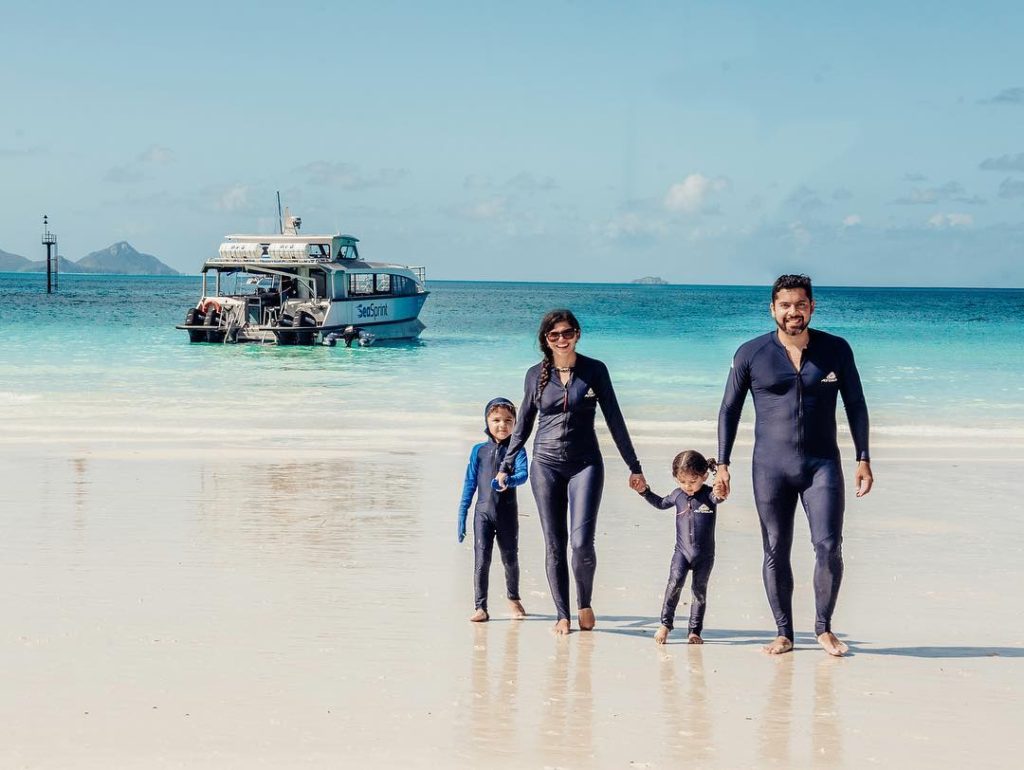
85. Your children are more resilient than you think. We’ve heard a lot of criticism that by traveling as much as we do, we’re putting our children through unnecessary stress and change. However, our kids have been absolute champions and are comfortable in multiple situations, customs, and circumstances.
86. We donated our stroller when our daughter turned 3 and it feels like a good decision so far. Although it is a bit harder to have to carry your kid when they get tired from walking, the benefits of not having to lug it around everywhere (especially fitting it in cars) far outweigh the minor inconveniences.
87. Kids can, and will, sleep anywhere when they’re tired. We used to think that our kids could only go to sleep if they were in a dark, quiet room with a sound machine helping to drift them off to sleep. It turns out we actually didn’t give our kids the opportunity to have the flexibility to fall asleep when and how they choose. Now, our kids will fall asleep in cars, planes, and even on our arms while we’re walking if they’re tired.
88. Kids can, and will, tantrum no matter what country you’re in. If you’re worried that your child won’t behave in a foreign country, you’re right. They won’t. But they also won’t if you stay at home. So why not just travel then? 😂
89. Kids can, and will, love ice cream no matter where you are. We’ve found that ice cream is one of the biggest ways to motivate our children to do something they don’t want to do (like their homeschooling homework, or take a picture, or walk down the street). And the best thing is, you will find ice cream just about everywhere in the world!
90. If your kids aren’t adjusting well to a new country, just take them to a park or playground. We’ve probably been to more than 100 playgrounds, and they’re all basically the same. They might be made out of wood, stone, or metal, but they’ll allow your kids to jump, climb, swing, and run around. And that freedom and consistency not only soothes them, but you as well when they end their time there happy and tired.
91. You can buy diapers pretty much anywhere in the world. So don’t feel like you need to pack a suitcase full of them, because even though sizing may differ, you’ll find it at grocery stores and pharmacies all over.
92. Find creative ways to teach your children new things. Currency exchanges are a great way to practice mathematics. Going to historical and religious monuments can turn into a shape recognition exercise. You can always find a stick and draw in the sand if you’re at the beach. All of these activities will make an excursion fun for the kids and still allow you to immerse yourself in the significance of the destination.
93. Let your kids choose what they want to do on some days. Giving the kids control of the schedule empowers them and gives them comfort. So yes, that might mean you’re making a trip to McDonald’s or another playground, but the boost in their mood can last for days as you plan the sightseeing activities that you want as well.
94. I was more attached to my daughter’s safety blanket than she was. When we arrived to the airport in Singapore ready to head to Malaysia, we realized we left my daughter’s elephant blanket Ellie in the taxi. We didn’t have time to get it due to our flight departure time. The first time my daughter asked for her blankie, I felt sadness and guilt that it was gone. She cried for a few minutes, but then somehow she got over it (and her baby doll became her new comfort item). To this day, I mourn for Ellie and the memories I have of my daughter with it, even though she’s already moved on.
95. Your kids may not remember the places you go to, and that’s OK. We use our photos and videos to jog their memory. Also, many of our dinnertime conversations center around places we’ve been. That allows them to try to recall memories from those locations (which many times will be different from the memories you made there too). And even if they don’t remember, there’s still many non-quantifiable qualities that they’ll develop (like resilience, flexibility, and cultural awareness).
96. In many countries, using car seats for kids is not customary. Don’t be afraid to follow their customs. We donated our car seat after our 2nd destination, because the research we did showed that a lot of the places we were going to didn’t really use car seats. It made travel days easier, and since we typically relied on public transportation and Uber, it would have been very cumbersome to carry a car seat on a tour.
97. Hiking with kids is like herding cats for hours, but the views at the end are always worth it. Yes, it’s going to take a lot of mental fortitude, patience, and agility as you try to keep your kid from falling down a mountain. But you’re also teaching your kids that it takes hard work and patience to get a reward. And not all rewards are monetary (or even candy). Sometimes, a great view and the look on your kids’ faces as they gaze in wonder can offer the best lesson to the whole family.
98. Coloring books and crayons are a big hit for random down times. We pack one in our backpack, so whenever we’re waiting somewhere, we can take them out and keep the kids occupied until our next activity.
99. Prep your kids for the next day’s events on the night before them. That way they have a better idea of what to expect when they wake up the next day, and you can even build in the next day’s activities into any bedtime story rituals.
The Final Tip
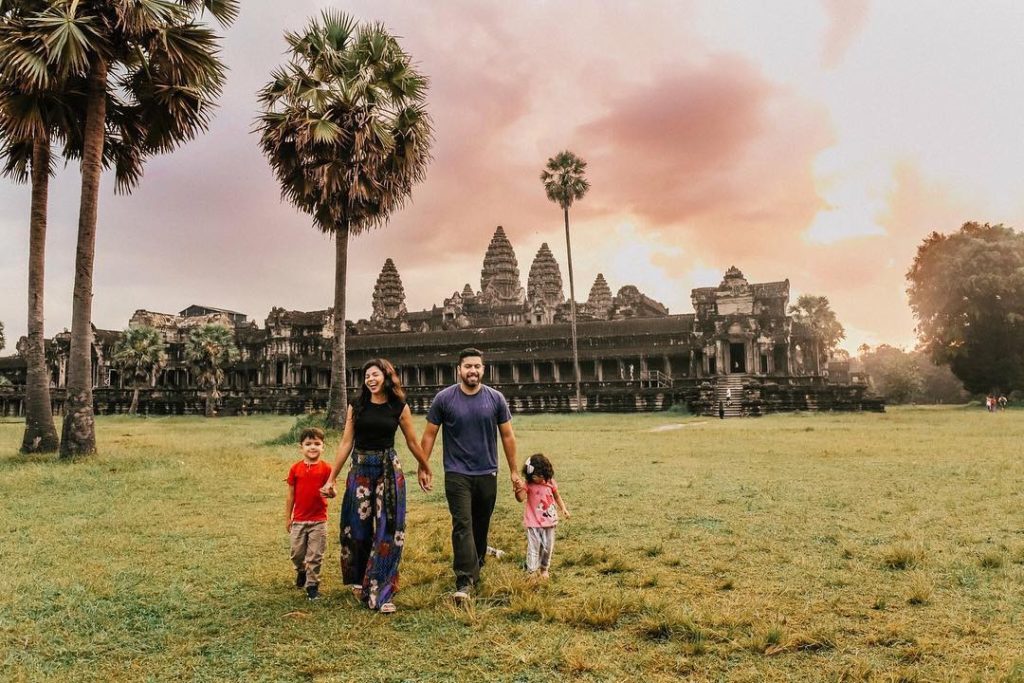
100. Everyone’s travel adventure is different; find your own groove and don’t let others get you down about your travel decisions! Out of all of our tips for traveling with kids, this may be the most important. Travel has been the biggest gift in our lives so far, and we wouldn’t trade it for anything! There are tons of self-proclaimed experts that will tell you what the “best” way to travel is, but ultimately your journey will be far different from theirs. Embrace the high points, withstand the lows, and you and your family will come out stronger and tighter-knit as a result.











Very nice post!
Also made me thank both my kids are easy flyers. 😂
They both slept all through flights untill they were about 5 and then swapt to hours of tablettime and hours of amazed looking through the window.
Last one is my overly active daughter. I would just fly to get a moment of peace.